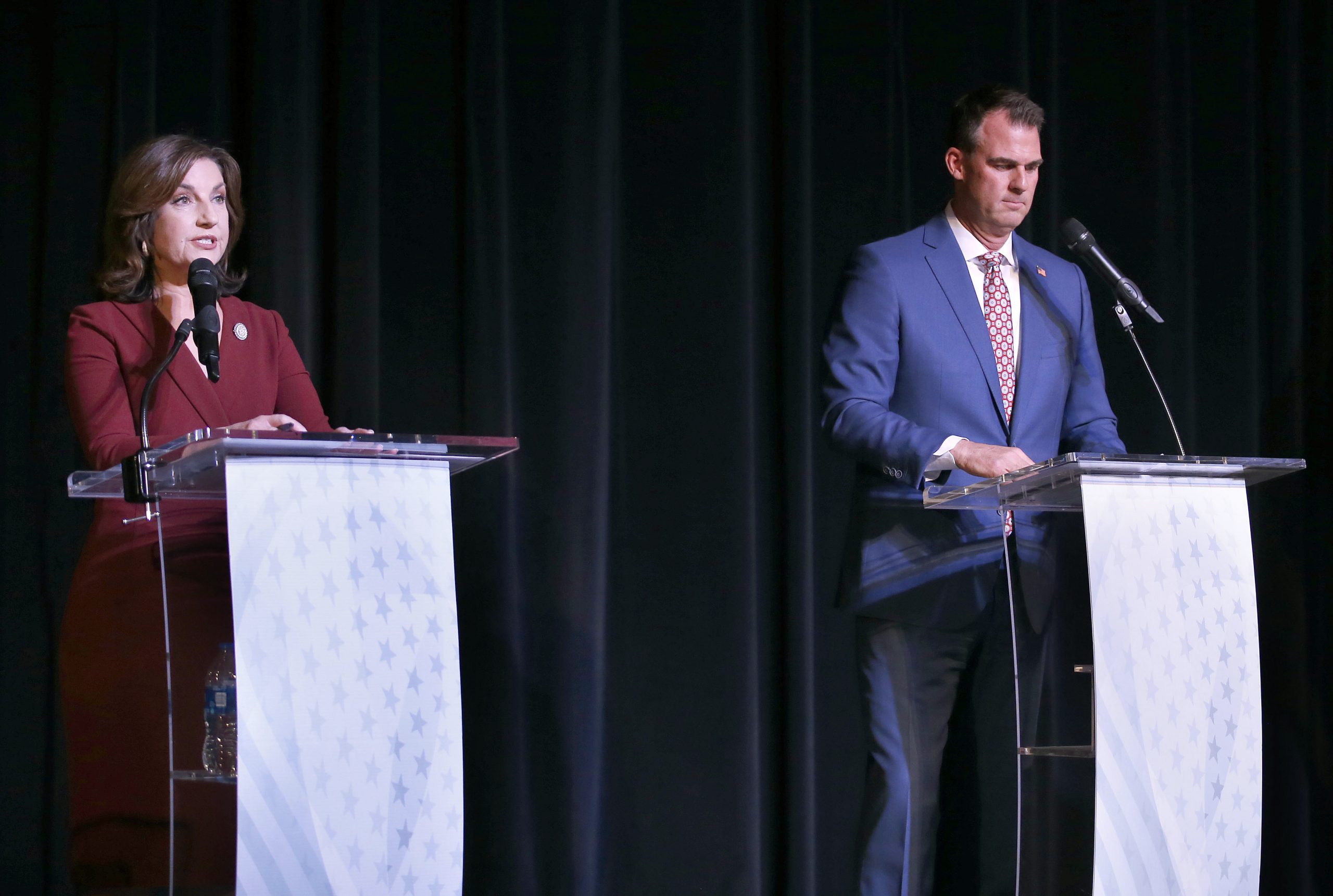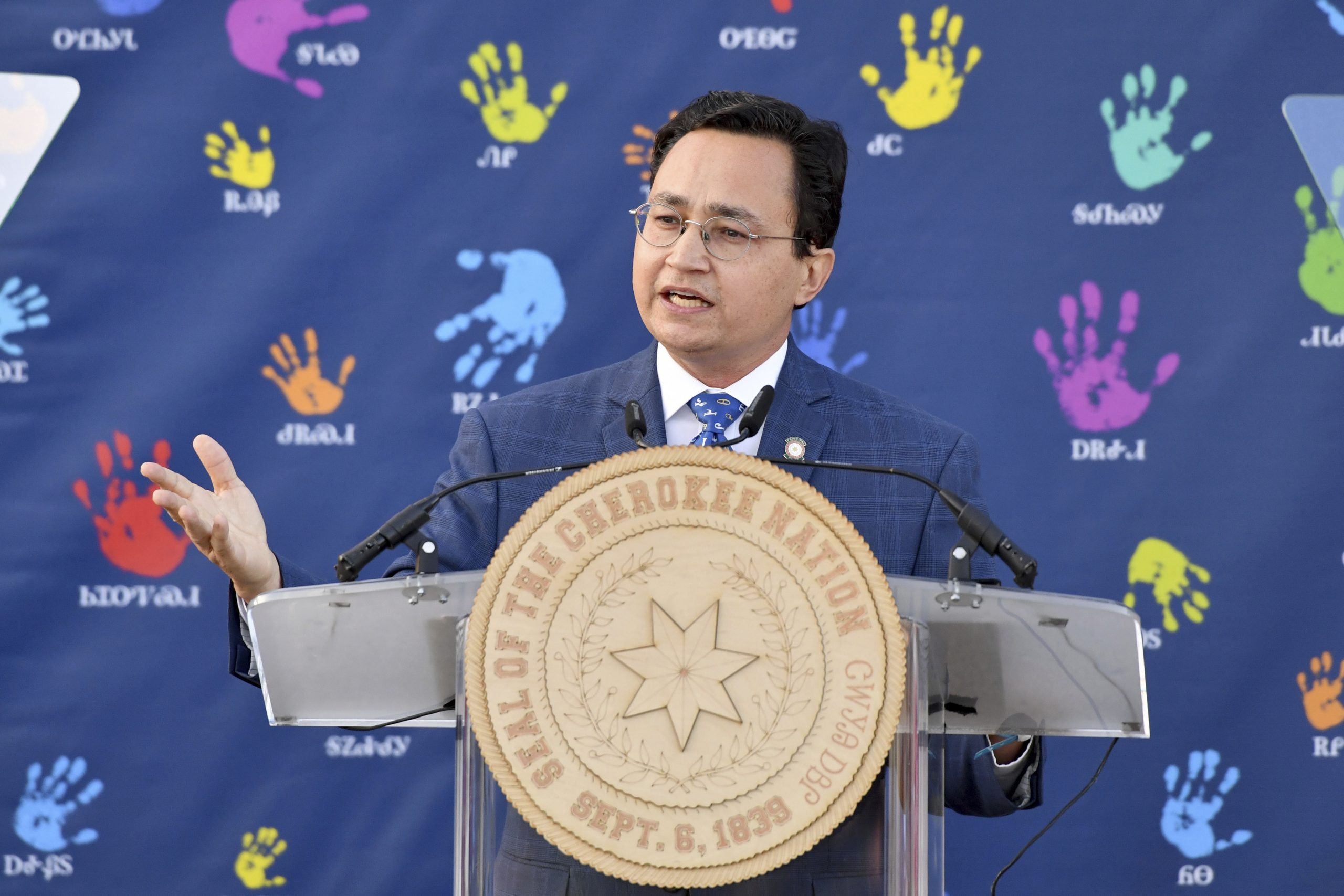During a Wednesday debate, Oklahoma Gov. Kevin Stitt (R) made an off-the-cuff invite for leaders of the state’s 39 tribes to meet with him on Thursday.
Ultimately, he was stood up, according to Secretary of State and Native American Affairs Brian Bingman.
Media crews gathered at the state Capitol on Thursday in anticipation that Stitt and tribal leaders might come together for a 10 a.m. meeting after a debate moderator asked Stitt on Wednesday when he would meet tribal leaders to “rebuild your administration’s strained relationship with tribes and tribal citizens?”
Bingman told a reporter that Stitt was in his office but “nobody showed up,” according to a recorded conversation provided to the Washington Examiner by a spokesperson for the governor.

FIVE TAKEAWAYS FROM OKLAHOMA GUBERNATORIAL DEBATE BETWEEN KEVIN STITT AND JOY HOFMEISTER
Stitt was speaking at an event earlier in the morning at the University of Oklahoma, roughly 23 miles away from the state Capitol. His spokeswoman says she was with the governor in his office at 9:53 a.m. The university did not respond to a request for comment.
A person who spoke at the event directly before Stitt, retired Lt. Gen. Gene Kirkland, told the Washington Examiner on Thursday evening that the governor “left around the schedule time from the room I was in” but noted he wasn’t “aware of when he actually left the facility.” A copy of the schedule shows that Stitt was slated to be finished speaking by 9:20 a.m., and the governor’s spokeswoman contends Stitt “walked out at 9:25.”
The no-show by tribal leaders at the state Capitol underscores the wilting relationship between the governor and the tribes at a time when several polls show a tight race between him and his Republican-turned-Democrat opponent Joy Hofmeister, the state’s superintendent of public instruction who changed parties last October to run against the incumbent. Hofmeister is endorsed jointly by the leaders of the five most powerful tribes in the state.
A reporter at the state Capitol asked Bingman if it was “reasonable” for the governor to give the tribal leaders less than 24 hours notice, but Bingman said that the governor was “just responding to a question from the debate,” adding that Stitt is willing to meet with them at any time.
Following the debate Wednesday night, Cherokee Nation Chief Chuck Hoskin Jr. rebuked Stitt for suggesting he could “command” tribal leaders to come to a meeting through an invitation during the debate.

“There has been no invitation to meet with Gov. Stitt and there is no meeting scheduled,” Hoskin told the Washington Examiner. “The fact that Gov. Stitt thinks he can command tribal leaders to his office by simply declaring on live television speaks volumes of why he has been a failure at state, tribal relations.”
Stitt, who is also a member of the Cherokee Nation, has said he has an “open door policy,” but has not had a meeting with leaders of the five largest tribes in the state since February 2021, according to the Oklahoman. It is not immediately clear whether leaders from the state’s five largest tribes — Cherokee, Chickasaw, Muscogee, Choctaw, and Seminole nations — have made concrete plans to meet with the governor since 2021.
Stitt and the tribal leaders have seen their relationship dwindle over the governor’s opposition to the Supreme Court‘s 2020 McGirt v. Oklahoma decision, which voided the state’s criminal jurisdiction to prosecute crimes committed by Native citizens against other Native citizens while also legally designating over 40% of Oklahoma’s state territory as “Indian Country.”
The cities of Tulsa and Owasso, two cities with territory that overlaps with Indian Country, filed a brief to the Supreme Court in October last year claiming the McGirt ruling reduced Native American crime victims to a “second-class status.”
“The tragic consequence is that some crimes are going unprosecuted, with a significant share committed by non-Indians against Indians,” the cities wrote in their brief. The high court ultimately opted against overturning McGirt but took up a similar case this spring.
In that case, Oklahoma v. Castro-Huerta, the Supreme Court ruled that Oklahoma has concurrent jurisdiction and can prosecute non-Natives when they commit crimes against Native people within reservation boundaries.
Tribal leaders saw the summer ruling as a reversal of the precedent under McGirt and expressed disappointment over the high court decision.
CLICK HERE TO READ MORE FROM THE WASHINGTON EXAMINER
“We are extremely disappointed in this ruling, in part because it appears to rely on faulty information provided by the opposition,” Choctaw Nation Chief Gary Batton said following the June decision.
“Of course, we respect the authority of the Supreme Court, and we will integrate this into our continued efforts to provide effective criminal justice in our reservation as we work with law enforcement agencies at the federal, state, local, and tribal level,” Batton added.
